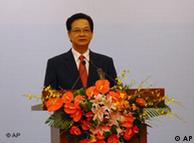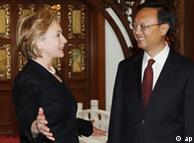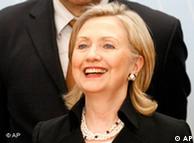新闻报道 | 2010.07.27
美国关注南海问题 中国强调'核心利益'
此次中美争论的焦点在于南海问题。中国南海处于太平洋到印度洋的中枢位置,自然资源丰富且战略地位重要。
围绕着南海海域的国家和地区主要有越南、菲律宾、马来西亚、文莱、台湾和中国大陆。据报道,该海域丰富的油气储备使得南海周边各方就该地区的归属和海域划分存有争端,尤其是在南沙群岛和西沙群岛。
目前中国的戍边部队主要驻守着南沙群岛的美济礁、渚碧礁、南薰礁、永暑礁、赤瓜礁、东门礁和华阳礁。台湾的武装部队主要在太平岛,其余主要被越南、菲律宾、马来西亚占据。
 Bildunterschrift: Großansicht des Bildes mit der Bildunterschrift: 东盟轮值主席国越南政府总理阮晋勇
Bildunterschrift: Großansicht des Bildes mit der Bildunterschrift: 东盟轮值主席国越南政府总理阮晋勇 东盟峰会关注南海问题
上周在越南河内举行的东盟峰会上,越南政府多次在部长级安全会议上提到南海问题。出席此次年度峰会的除了东盟10个成员国以外,还有中国、美国、俄罗斯、日本以及韩国。
在7月23日的闭门会议上,除了越南以外,文莱、缅甸、柬埔寨、印度尼西亚、老挝、马来西亚、菲律宾、新加坡和泰国也纷纷就棘手的南海问题展开讨论。
美国介入 力挺越南
此外,美国国务卿希拉里也在出席此次东盟峰会时出人意料的介入南海问题。在会议发言中,希拉里表示美国对南沙群岛和西沙群岛的争端表示关切,并支持越南的观点称,该地区的长期争端必须通过多边谈判来解决。
希拉里表示,"美国支持所有提出主权要求的各国合作和协商解决南海问题",并主张形成一个解决南海问题的国际机制。她在发言中说:"在南海自由航行、亚洲海上事务保持开放状态、在南海地区尊重国际法,这些关乎美国的国家利益"
美国表明立场后,据日本共同社报道,日本外相冈田克也于27日下午在记者会上就南海的领土争端强调,除当事国外,应该促进包括东盟各国、日本、美国等在内的国际框架下的对话。
 Bildunterschrift: Großansicht des Bildes mit der Bildunterschrift: 美国国务卿希拉里·克林顿(左)和中国外交部长杨洁篪(右)
Bildunterschrift: Großansicht des Bildes mit der Bildunterschrift: 美国国务卿希拉里·克林顿(左)和中国外交部长杨洁篪(右) 中国反应强烈
而中国在此次会议上也并未沉默。"中国外交部长杨洁篪(在闭门会议上)就南海问题十分强烈地表达了北京的立场",一名不愿意透露姓名的东南亚官员告诉国际新闻社(IPS)。
"北京不希望南海问题国际化",泰国英文杂志《国家》(The Nation)的评论员卡文(Kavi Chongkittavorn)发表评论写道,"如今的东盟轮值主席国越南也是在走钢丝,因为越南自己也是冲突中的一方"。
"河内政府没有直接触及问题,而是比较谨慎的提醒了涉及南海问题的各方来关注此问题",卡文解释说,"最近一次中越双方就该问题展开的工作小组会议并未取得进展。"
美国东盟政策转变
希拉里所表明的这一立场反映出了美国政府对待东盟的政策转变。此前的布什政府较少干涉这一地区,而如今的奥巴马政府则希望在东南亚一带加强多边合作。
"很清楚的是,奥巴马政府在执政初期时就环顾了世界,然后意识到(过去政府的政策)过于注重在反恐和双边关系上",曾在东南亚三个国家驻守过的前美 国外交官菲茨(Robert Fitts)向国际新闻社表示,"东盟提供了这样一个多边合作的机会,这正是奥巴马政府如今积极追寻的。"
美国政府对于中国南海问题的关注就体现了这一点,但美国的关注和介入也引起了中国方面的强烈反应。菲茨说,"北京在去年10月就向华盛顿表示,南海问题是中国的'核心利益'区域。"
此前,中国政府也曾将'核心利益'这一描述用于台湾问题和西藏问题来应对外界的批评。
消息来源:国际新闻通讯社
综合报道:月洋
责编: 石涛

Secretary of State Hillary Rodham Clinton at the Asean Regional Forum in Hanoi on Friday.
By MARK LANDLER
Published: July 23, 2010
HANOI, Vietnam — Opening a new source of potential friction with China, the Obama administration said Friday that it would step into a tangled dispute between China and its smaller Asian neighbors over a string of strategically significant islands in the South China Sea.

The New York Times
Secretary of State Hillary Rodham Clinton, speaking at an Asian regional security meeting in Vietnam, stressed that the United States remained neutral on which regional countries had stronger territorial claims to the islands. But she said that the United States had an interest in preserving free shipping in the area and that it would be willing to facilitate multilateral talks on the issue.
Though presented as an offer to help ease tensions, the stance amounts to a sharp rebuke to China. Beijing has insisted for years that all the islands belong to China and that any disputes should be resolved by China. In March, senior Chinese officials pointedly warned their American counterparts that they would brook no interference in the South China Sea, which they called part of the “core interest” of sovereignty.
Many of the islands are just rocks or spits of sand, but they are rich in oil and natural gas deposits, and China views them as important outposts that extend its territorial waters far into the busy shipping lanes in the sea.
“The United States has a national interest in freedom of navigation, open access to Asia’s maritime commons and respect for international law in the South China Sea,” Mrs. Clinton said.
The announcement was a significant victory for the Vietnamese, who have had deadly clashes in past decades with China over some of the islands. Vietnam’s strategy has been to try to “internationalize” the disputes by bringing in other players for multilateral negotiations.
The administration’s decision to get involved appeared to catch China flat-footed and angered its foreign minister, Yang Jiechi, at a time when the country is already on edge over naval exercises the United States and South Korea will hold starting this weekend off the Korean Peninsula.
Twelve of the 27 countries at the security meeting spoke out in favor of a new approach to the South China Sea, prompting Mr. Yang to observe that the American effort seemed orchestrated.
International concern has been deepening about China’s maritime ambitions, which have expanded with its economic and military muscle. China raised tensions with Vietnam this year with plans to develop tourism in one of the island groups, the Paracels, which the two nations fought over in 1974 before China assumed full control. They had another lethal clash in 1988 over the Spratly island group.
In recent months, administration officials said, China has harassed fishing boats and leaned on energy companies that have tried to make offshore deals with other countries.
Although American relations with China on political and economic matters are regarded as stable, military ties have become strained over United States arms sales to Taiwan and American concerns about China’s growing naval ambitions. In June, China withdrew an invitation to host a visit by Defense Secretary Robert M. Gates, and the two have largely suspended regular military-to-military talks.
This week, China was already bristling over the joint American-South Korean naval exercises because some drills are to take place in the Yellow Sea, which China claims as a military operation zone.
At the security meeting, other tensions flared on the familiar front of North Korea, with a North Korean official threatening a “physical response” to the naval exercises. The United States made no secret that it intended the drills to be a deterrent to North Korean aggression. It announced them after an investigation led by South Korea found the North responsible for torpedoing a South Korean ship, the Cheonan, in March.
The North Korean official, Ri Tong-il, said, “This is not defensive training,” noting that the United States was deploying one of its most formidable nuclear-powered aircraft carriers, the George Washington, in the exercises. “It is a grave threat to the Korean Peninsula and also to the region of Asia as a whole.”
But North Korea has opened a small window of engagement on the issue. Military officers from North Korea and the United Nations Command met on the inter-Korean border on Friday for the second time this month to discuss the sinking. Meeting at the border village of Panmunjom, colonels from both sides “exchanged ideas and further details for convening a joint assessment group” to investigate “the cause of the armistice violations that led to the sinking,” the American-led United Nations Command said.
It remained unclear whether North Korea accepted the proposal. North Korea has so far insisted that it conduct its own investigation by sending a team of “inspectors” to South Korea.
On Friday, the United Nations Command notified North Korea of plans to hold another joint America and South Korean military exercise: an annual drill from Aug. 16 to Aug. 26. As is normal for the annual drill, no location was announced.
Mrs. Clinton’s stop in Hanoi wrapped up a grueling trip that amounted to a tour of American wars, past and present: from Afghanistan to the demilitarized zone in South Korea, and finally to Vietnam, where, in a sunset ceremony, she watched the remains of three American soldiers killed in the war placed on an Air Force transport plane to be returned to the United States.
Mrs. Clinton sought to apply lessons from the American experience in the Korean War to Afghanistan. “We saw South Korea struggle to become a functioning democracy — huge amounts of instability, coups, corruption, scandal, you name it,” she said. “It’s good to remind ourselves: the United States has stood with countries that went through a lot of ups and downs for a lot longer than eight years.”

沒有留言:
張貼留言